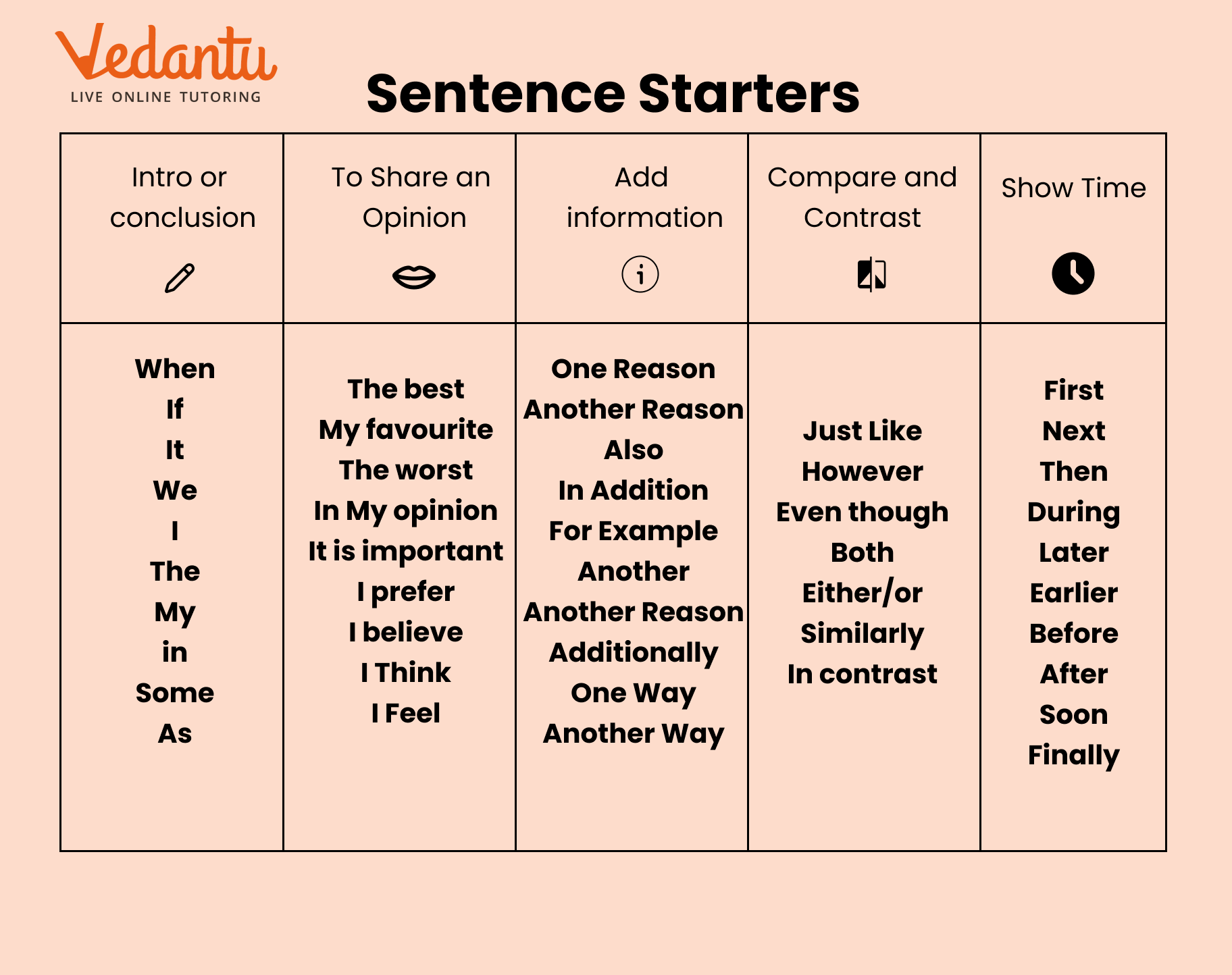




25 Powerful Sentence Starters for Essays, Stories, and Reports
FAQs on Sentence Starters Meaning and Examples: Improve Your Writing Skills
1. What are sentence starters and what is their main purpose in writing?
Sentence starters are words or phrases used at the very beginning of a sentence. Their main purpose is to make writing more structured, engaging, and clear by introducing ideas, showing relationships between points, and preventing monotonous sentence structures.
2. How do sentence starters improve the quality of an essay or story?
Using a variety of sentence starters significantly improves writing quality by creating a better flow and rhythm. They act as signposts for the reader, guiding them through your arguments or narrative smoothly. This enhances readability, coherence, and sophistication, which are key criteria in CBSE English evaluations for the 2025-26 session.
3. What are some effective sentence starters for an introduction paragraph?
Effective sentence starters for an introduction hook the reader and state the topic. Examples include:
To introduce a general truth: 'It is often said that...'
To present a topic for discussion: 'This essay will explore the significance of...'
To set a scene: 'In the world of...' or 'Throughout history,...'
To state a purpose directly: 'To begin with, it is essential to understand...'
4. How can I use different sentence starters to connect body paragraphs smoothly?
To connect body paragraphs, use transitional sentence starters that signal a shift in thought or build upon a previous point. For instance:
To add a similar point: 'Furthermore,', 'Moreover,', 'In addition,'
To show contrast: 'On the other hand,', 'However,', 'Despite this,'
To introduce the next point: 'Another key factor is...', 'Subsequently,'
This technique creates a logical bridge between your ideas.
5. What are the best sentence starters for writing a strong conclusion?
The best conclusion starters signal a summary and provide a sense of closure. Instead of only using 'In conclusion,' try more impactful options like:
To summarise: 'To sum up,', 'In essence,'
To show finality: 'Ultimately,', 'Evidently,'
To offer a final thought: 'Therefore, it is clear that...'
6. Why is it a bad practice to always start sentences with 'The' or the subject's name?
Constantly starting sentences with the subject (e.g., 'The cat sat on the mat. The cat was black.') creates a choppy and repetitive rhythm. This lack of variety can make your writing seem simplistic and unengaging. Using different sentence starters forces you to vary your sentence structure, which is a hallmark of effective and mature writing skills as per the NCERT guidelines.
7. What is the difference between sentence starters for persuasive writing versus narrative writing?
The difference lies in their purpose. Persuasive starters aim to assert a point and build an argument (e.g., 'Undoubtedly,', 'It is evident that,', 'For this reason,'). In contrast, narrative starters aim to set a scene, advance the plot, or establish a mood (e.g., 'As dawn broke,', 'Without warning,', 'Long ago in a distant land,').
8. Beyond single words, what are some advanced ways to start a sentence?
To elevate your writing, start sentences with different grammatical structures:
With a prepositional phrase: 'Under the starry sky, the travellers rested.'
With an adverb: 'Suddenly, the door creaked open.'
With a subordinate clause: 'Although he was tired, he continued to work.'
With a participle phrase (-ing or -ed): 'Running towards the finish line, she felt a surge of adrenaline.'
This demonstrates a strong command of sentence construction.
9. Can you provide examples of sentence starters for giving evidence in an answer?
Yes, when providing evidence or examples to support a point, especially in exam answers, use clear and direct starters. Good options include:
'For example,...'
'For instance,...'
'To illustrate this point,...'
'This is evidenced by...'
'A case in point is...'
10. Are sentence starters only for beginners, or do professional writers use them too?
While beginners learn with basic sentence starter lists, the underlying principle—varying sentence openings for effect—is a fundamental technique used by all skilled writers. Professionals use them in a more sophisticated and integrated way to control the pace, rhythm, and flow of their work. They are not a crutch but a foundational tool for effective communication.























